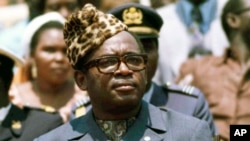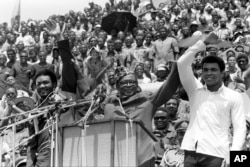Twenty years after he passed away, there is nothing in the capital of the former Zaire to remind visitors of Mobutu Sese Seko, the man famous for building big statues, bringing Muhammad Ali to Kinshasa, and ruling the country with an iron fist for 32 years.
A group of his associates says Mobutu, as he was generally known, is being deliberately ignored. They are trying to revive his old party, the MPR, and are calling for his recognition by leaders of today's Democratic Republic of Congo.
Lando Katambongo is Mobutu’s cousin and his former personal assistant. He says Mobutu deserves to be "rehabilitated."
"He is a son of this country, he is not a stranger," he told VOA's French to Africa service. "He fought for this country, he fought for unity. We must at least recognize that. You see, when they put photos of those who made history in this country, they put everybody’s except his."
Alain Dilangu Mobutu is the adopted son of the former dictator. He says under Mobutu's successors, the country has lost its prestige.
"I don't know, when I or others call themselves Congolese, if that still has the same meaning," he says. "We are rejected in countries where we used to go with pride. We are dominated by countries where we used to have some influence."
Not all Congolese have such high opinions of Mobutu, who was renowned for brutality to opponents, corruption on a multi-billion-dollar scale and an opulent lifestyle symbolized by his fleet of Mercedes-Benz cars and a habit of chartering supersonic Concorde aircraft for trips abroad.
The corruption and spending left most Congolese (or Zairians, as they were called) living in poverty.
Good memories
Still, some diehards have good memories of Mobutu's campaign to strip colonial influences from the country or his role in staging the Muhammad Ali-George Foreman heavyweight championship match in 1974, won by Ali.
Xavier Lukelo Longo was part of Mobutu's inner circle until he fled the country. He suggests Mobuto would have been able to handle the tensions among Congo's various ethnic groups.
"Without forgiveness, nothing can be built. And my boss was in favor of forgiveness. He loved his country. He didn't see a difference between us, regardless of our ethnic backgrounds," he says.
Mobutu died 1997 in exile in Morocco and is buried there. Repatriating his remains is another item on the agenda of those who still refer to him as "Marshal."
“We will use all the means available to us, political means, the family, to bring back the remains of the Marshal, in the land of his ancestors," Alain Mobutu said.
He added that his party will fight for Etiennes Tshisekedi’s corpse to be repatriated as well. Both, he said, fought for the country.
Etiennes Tshisekedi, the former opposition leader, died in February in Brussels, but the repatriation of his remains is at the heart of ongoing battle among the government, his party and his family.





